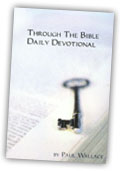10/22
Obadiah 1:15
15For the day of the LORD is near upon all the nations. As you have done, it shall be done to you; your deeds shall return on your own head.
Though there is a final Day of the LORD in which He will judge the nations. Nations have experienced the judgments of God throughout history. What they have sown, they have also reaped. It is true for individuals as well. Paul the Apostle wrote that those who sow to the flesh shall of the flesh reap corruption (Galatians 6:8). Jesus said that those who take the sword shall die by the sword (Matthew 26:52), and the merciful shall receive mercy (Matthew 5:7).
Obadiah was prophesying to the nation of Edom. They had taken part in the plunder of Judah, though they were distant cousins of the Israelites. They were warned that as they had done, it would be done to them. If we really believed that what we do to others would be done to us, how would our actions change? How would a nation change? If we really believed our deeds would return on our own head, what kind of deeds would we do today? Would we not be looking for opportunities to aid the needy and encourage and help others? Would we not be careful to do no harm both verbally and physically to anyone?
Obadiah's message was a warning that judgment was certain. Their pride had made them arrogant (Obadiah 1:3). Hopefully there is still time for us to repent and plead for mercy when we think of how we have spoken and treated others. Kindness and gentleness are fruits of the Spirit of God living in His children (Galatians 5:22-23). In like manner, we should want others to speak truth to us when we are straying.
Consider: Before you act or speak today, think to yourself, "Is this how I want others to be toward me?" This is another way to express the Golden Rule.








